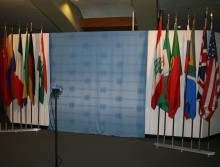
Just speeches, or is it more this time? UN Security Council Press Conference Area. Illustrative. By Joshua Spurlock
Representatives from France and the United Kingdom on the influential United Nations Security Council have backed the idea of having the powerful world body issue a resolution on a “framework” for resolving the Israel-Palestinian conflict, with France reportedly drafting just such a ruling. French Representative to the UN Francois Delattre, in comments summarized by a UN press release on the Security Council meeting, said that the Security Council should create a “framework” for talks, while saying this isn’t about “imposing a solution” on the sides.
While no specifics were laid out in the report there have already been unsuccessful efforts in the past to lay out the general “framework” of a deal to create a Palestinian state, including borders, by the Palestinians. This time, France has the support of multiple nations on the 15-member Security Council.
New Zealand’s ambassador referenced that France was working on a “parameters” resolution while offering his nation’s potential support, while the UK’s representative also called for a “parameters” resolution for a “peaceful and negotiated solution”, according to press releases from those respective missions to the UN.
New Zealand’s Jim McLay was quoted by their website as telling the Security Council they would back a French resolution “if it has a chance of succeeding,” noting the goal of such a resolution would be to get the sides negotiating as soon as possible.
Israel and the Palestinians have had on and off peace talks for roughly two decades, with the latest round being broken off by the Palestinians. Negotiations have been officially dormant for some time.
The UN Security Council is the strongest arm of the UN, with the power to levy sanctions and empower international military intervention. A super-majority of nine of the 15 members is needed to pass a resolution, but five nations—France, the UK, China, Russia and the US—each have veto powers.
In the past, the US has not needed to use their veto powers to defeat Palestinian efforts to get the Security Council to rule on their statehood, but with the UK and New Zealand backing France, getting nine votes on a resolution regarding the conflict is entirely possible.
The US has long said the only path to reaching a final settlement between Israel and the Palestinians is through negotiations between the sides and has critiqued the Palestinians for turning to the UN instead.
However, this time the US may have to decide if it’s wiling to use it’s veto to prevent Security Council action. The French UN mission tweeted their perspective on the matter by saying “France chooses to act. The emergence of Palestinian state is our responsibility” as a Security Council member.
Israeli Representative to the UN Ron Proser, meanwhile, had a chance during the UN meeting to remind the audience of the history of the negotiations with the Palestinians.
“The Palestinians want a state without making compromises, making concessions, or making peace,” Proser was quoted as saying on the Israel mission to the UN website. “I want to be clear. Israel is in favor of a Palestinian state that would end the conflict. On three separate occasions, Israel offered the Palestinians a state and on all three occasions, the Palestinians refused the deal or walked away from the table.”
Proser also highlighted the primary cause of the Israel-Arab conflict. “The fact of the matter is that our conflict is not about the right place for Israel’s borders. It’s about Israel’s right to exist in the first place.”
(By Joshua Spurlock, www.themideastupdate.com, April 22, 2015)
